@skl1g14
in case anyone looking for URDF for m500 drone, i have it here
https://github.com/UoSM-CIRG/CAD-Files/tree/master/drone_dev_kit/catkin_ws/src/display_model/description/m500_urdf/urdf
Best posts made by skl1g14
-
RE: Are there any URDF for the dev drones>?posted in VOXL Dev Drones
Latest posts made by skl1g14
-
RE: USB tethering with VOXLposted in VOXL Flight
Here is the hack if anyone needs it.
The latest platform image have the RNDIS host flag set. https://gitlab.com/voxl-public/system-image-build/meta-voxl/-/blob/master/recipes-kernel/linux-quic/files/enable_RNDIS_HOST.cfg?ref_type=heads
-
First step is to get a compatible OTG cable. I got an off-brand one that works. Run dmesg -wH on your jetson carrier board. If there are the usb0/rndis0/l4tbr0 means the connection is solid.
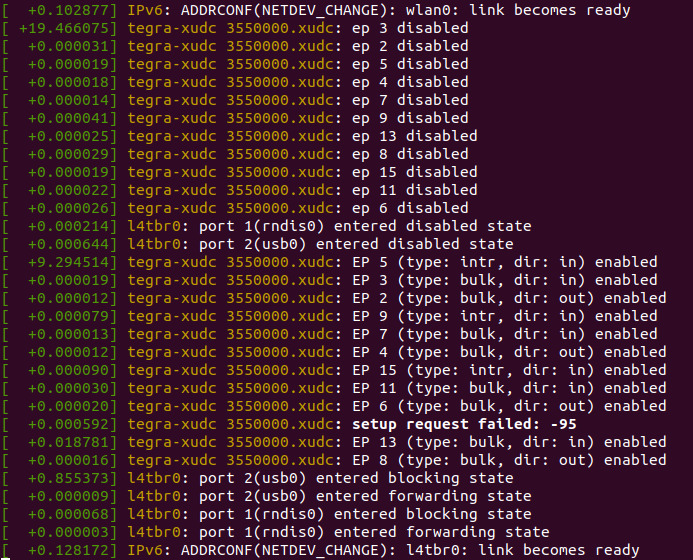
-
In voxl, save the following script somewhere. /home/root/usb_tethering.sh is a good choice.
#!/bin/bash # Enable IP forwarding echo 1 > /proc/sys/net/ipv4/ip_forward # Bring up usb0 interface ifconfig usb0 up # Assign IP address to usb0 ifconfig usb0 192.168.55.2 netmask 255.255.255.0 # Add route for USB network route add -net 192.168.55.0 netmask 255.255.255.0 dev usb0 # Set up iptables rules for NAT iptables -A FORWARD -o wlan0 -i usb0 -s 192.168.55.0/24 -m conntrack --ctstate NEW -j ACCEPT iptables -A FORWARD -m conntrack --ctstate ESTABLISHED,RELATED -j ACCEPT iptables -t nat -A POSTROUTING -o wlan0 -j MASQUERADE- Make it persistent by creating a systemd service. Save it at /etc/systemd/system/tethering.service
[Unit] Description=USB Tethering Service After=network.target [Service] Type=simple ExecStart=/home/root/usb_tethering.sh [Install] WantedBy=default.target- Run the following
sudo systemctl daemon-reload sudo systemctl enable tethering.service-
Check with ifconfig on voxl (should have a static addr 192.168.55.2 for usb0 interface)
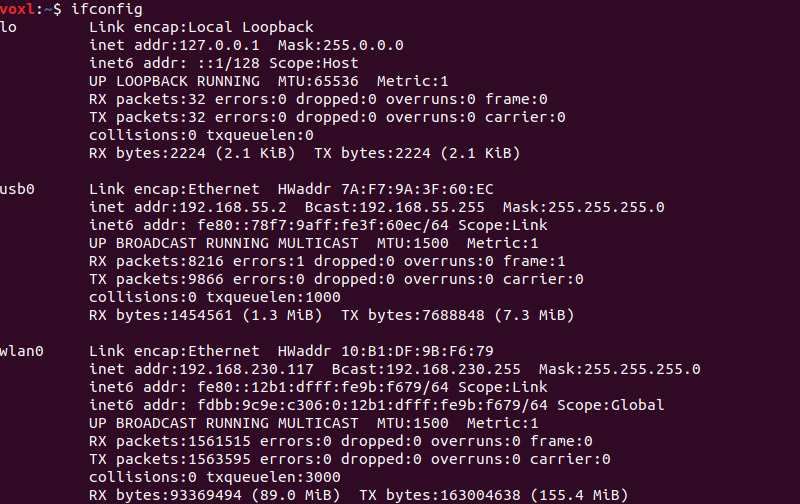
-
Check with ifconfig on jetson carrier board (the l4tbr0 default addr should be 192.168.55.1)
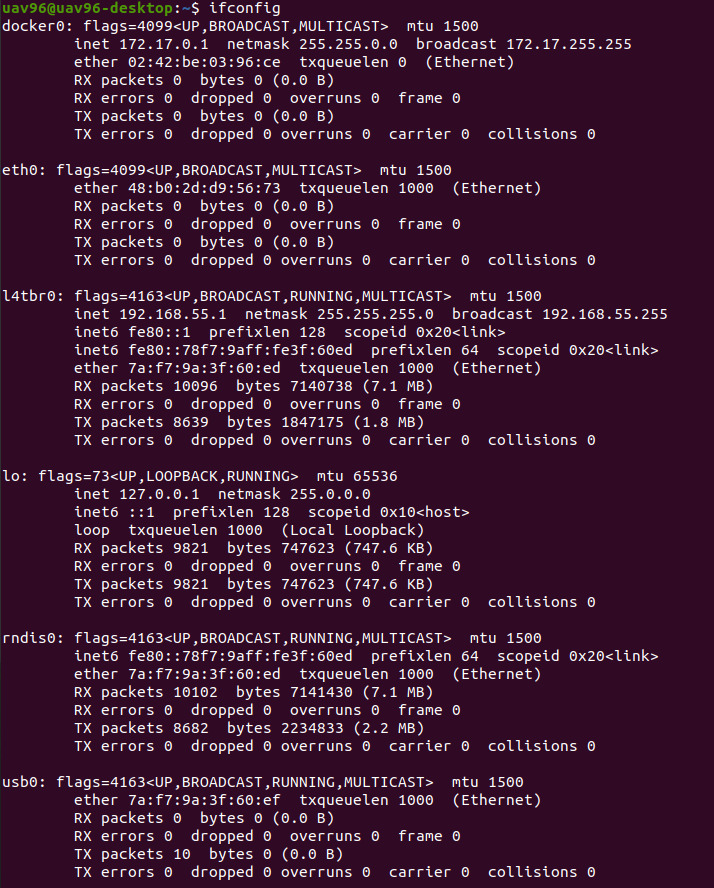
-
Try pinging each other (optional)
-
In voxl, set to station mode and connect to a access point. For jetson carrier board, check if it is possible to connect to a public web.
ping google.com
- In jetson, the dns nameserver for the l4tbr0 interface may need to change to 8.8.8.8.
Check with
systemd-resolve --status- Alternatively, change globally by modifying the nameserver address to 8.8.8.8 at /etc/resolv.conf
Bandwidth ~ 265 Mbps which should be expected from a usb2.0 controller (max 480 Mbps) and the overhead from the interfaces.
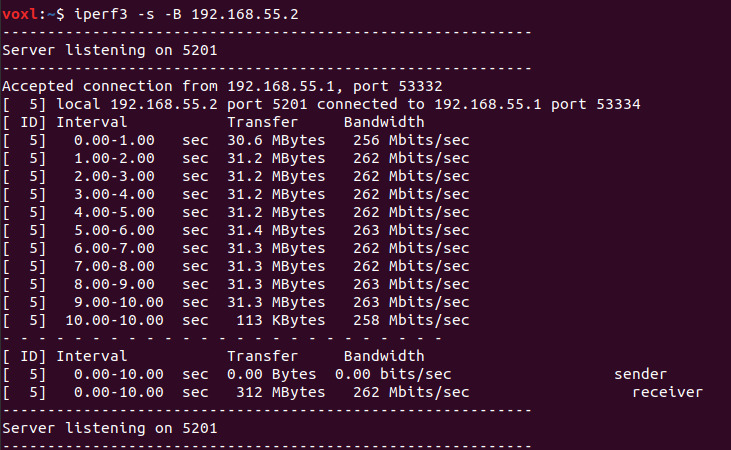
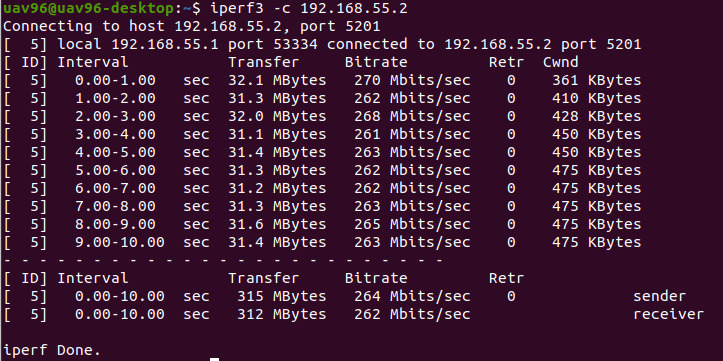
-
-
RE: Supporting power monitor to see battery statusposted in Flight Core v2
Yes, i believe that might be the case. There might be some other px4 firmware parameters that are causing it.
-
RE: Supporting power monitor to see battery statusposted in Flight Core v2
Default px4 parameter list.
# Onboard parameters for Vehicle 1 # # Stack: PX4 Pro # Vehicle: Multi-Rotor # Version: 1.14.0 dev # Git Revision: b02a6b4ae902003f # # Vehicle-Id Component-Id Name Value Type 1 1 ASPD_SCALE_1 1.000000000000000000 9 1 1 BAT1_CAPACITY 3000.000000000000000000 9 1 1 BAT1_N_CELLS 4 6 1 1 BAT1_R_INTERNAL 0.008000000379979610 9 1 1 BAT1_SOURCE 0 6 1 1 BAT1_V_CHARGED 4.150000095367431641 9 1 1 BAT1_V_EMPTY 3.599999904632568359 9 1 1 BAT1_V_LOAD_DROP 0.100000001490116119 9 1 1 BAT_AVRG_CURRENT 15.000000000000000000 9 1 1 BAT_CRIT_THR 0.250000000000000000 9 1 1 BAT_EMERGEN_THR 0.100000001490116119 9 1 1 BAT_LOW_THR 0.300000011920928955 9 1 1 BAT_N_CELLS 4 6 1 1 BAT_V_CHARGED 4.150000095367431641 9 1 1 BAT_V_EMPTY 3.599999904632568359 9 1 1 BAT_V_LOAD_DROP 0.300000011920928955 9 1 1 CAL_ACC0_ID 2490378 6 1 1 CAL_ACC0_PRIO 50 6 1 1 CAL_ACC0_ROT -1 6 1 1 CAL_ACC0_XOFF 0.000000000000000000 9 1 1 CAL_ACC0_XSCALE 1.000000000000000000 9 1 1 CAL_ACC0_YOFF 0.000000000000000000 9 1 1 CAL_ACC0_YSCALE 1.000000000000000000 9 1 1 CAL_ACC0_ZOFF 0.000000000000000000 9 1 1 CAL_ACC0_ZSCALE 1.000000000000000000 9 1 1 CAL_ACC1_ID 2490386 6 1 1 CAL_ACC1_PRIO 50 6 1 1 CAL_ACC1_ROT -1 6 1 1 CAL_ACC1_XOFF 0.000000000000000000 9 1 1 CAL_ACC1_XSCALE 1.000000000000000000 9 1 1 CAL_ACC1_YOFF 0.000000000000000000 9 1 1 CAL_ACC1_YSCALE 1.000000000000000000 9 1 1 CAL_ACC1_ZOFF 0.000000000000000000 9 1 1 CAL_ACC1_ZSCALE 1.000000000000000000 9 1 1 CAL_ACC2_ID 0 6 1 1 CAL_ACC3_ID 0 6 1 1 CAL_AIR_CMODEL 0 6 1 1 CAL_AIR_TUBED_MM 1.500000000000000000 9 1 1 CAL_AIR_TUBELEN 0.200000002980232239 9 1 1 CAL_BARO0_ID 0 6 1 1 CAL_BARO1_ID 0 6 1 1 CAL_BARO2_ID 0 6 1 1 CAL_BARO3_ID 0 6 1 1 CAL_GYRO0_ID 2490378 6 1 1 CAL_GYRO0_PRIO 50 6 1 1 CAL_GYRO0_ROT -1 6 1 1 CAL_GYRO0_XOFF -0.007948651909828186 9 1 1 CAL_GYRO0_YOFF 0.006882027722895145 9 1 1 CAL_GYRO0_ZOFF 0.005271935835480690 9 1 1 CAL_GYRO1_ID 2490386 6 1 1 CAL_GYRO1_PRIO 50 6 1 1 CAL_GYRO1_ROT -1 6 1 1 CAL_GYRO1_XOFF -0.014327573589980602 9 1 1 CAL_GYRO1_YOFF 0.010455547831952572 9 1 1 CAL_GYRO1_ZOFF 0.001255361014045775 9 1 1 CAL_GYRO2_ID 0 6 1 1 CAL_GYRO3_ID 0 6 1 1 CAL_MAG0_ID 396809 6 1 1 CAL_MAG0_PRIO 75 6 1 1 CAL_MAG0_ROT 10 6 1 1 CAL_MAG0_XCOMP 0.000000000000000000 9 1 1 CAL_MAG0_XODIAG 0.000000000000000000 9 1 1 CAL_MAG0_XOFF 0.000000000000000000 9 1 1 CAL_MAG0_XSCALE 1.000000000000000000 9 1 1 CAL_MAG0_YCOMP 0.000000000000000000 9 1 1 CAL_MAG0_YODIAG 0.000000000000000000 9 1 1 CAL_MAG0_YOFF 0.000000000000000000 9 1 1 CAL_MAG0_YSCALE 1.000000000000000000 9 1 1 CAL_MAG0_ZCOMP 0.000000000000000000 9 1 1 CAL_MAG0_ZODIAG 0.000000000000000000 9 1 1 CAL_MAG0_ZOFF 0.000000000000000000 9 1 1 CAL_MAG0_ZSCALE 1.000000000000000000 9 1 1 CAL_MAG1_ID 0 6 1 1 CAL_MAG1_ROT -1 6 1 1 CAL_MAG2_ID 0 6 1 1 CAL_MAG2_ROT -1 6 1 1 CAL_MAG3_ID 0 6 1 1 CAL_MAG3_ROT -1 6 1 1 CAM_CAP_FBACK 0 6 1 1 CA_AIRFRAME 0 6 1 1 CA_FAILURE_MODE 0 6 1 1 CA_METHOD 2 6 1 1 CA_R0_SLEW 0.000000000000000000 9 1 1 CA_R10_SLEW 0.000000000000000000 9 1 1 CA_R11_SLEW 0.000000000000000000 9 1 1 CA_R1_SLEW 0.000000000000000000 9 1 1 CA_R2_SLEW 0.000000000000000000 9 1 1 CA_R3_SLEW 0.000000000000000000 9 1 1 CA_R4_SLEW 0.000000000000000000 9 1 1 CA_R5_SLEW 0.000000000000000000 9 1 1 CA_R6_SLEW 0.000000000000000000 9 1 1 CA_R7_SLEW 0.000000000000000000 9 1 1 CA_R8_SLEW 0.000000000000000000 9 1 1 CA_R9_SLEW 0.000000000000000000 9 1 1 CA_ROTOR0_AX 0.000000000000000000 9 1 1 CA_ROTOR0_AY 0.000000000000000000 9 1 1 CA_ROTOR0_AZ -1.000000000000000000 9 1 1 CA_ROTOR0_CT 6.500000000000000000 9 1 1 CA_ROTOR0_KM 0.050000000745058060 9 1 1 CA_ROTOR0_PX 0.150000005960464478 9 1 1 CA_ROTOR0_PY 0.150000005960464478 9 1 1 CA_ROTOR0_PZ 0.000000000000000000 9 1 1 CA_ROTOR10_AX 0.000000000000000000 9 1 1 CA_ROTOR10_AY 0.000000000000000000 9 1 1 CA_ROTOR10_AZ -1.000000000000000000 9 1 1 CA_ROTOR10_CT 6.500000000000000000 9 1 1 CA_ROTOR10_KM 0.050000000745058060 9 1 1 CA_ROTOR10_PX 0.000000000000000000 9 1 1 CA_ROTOR10_PY 0.000000000000000000 9 1 1 CA_ROTOR10_PZ 0.000000000000000000 9 1 1 CA_ROTOR11_AX 0.000000000000000000 9 1 1 CA_ROTOR11_AY 0.000000000000000000 9 1 1 CA_ROTOR11_AZ -1.000000000000000000 9 1 1 CA_ROTOR11_CT 6.500000000000000000 9 1 1 CA_ROTOR11_KM 0.050000000745058060 9 1 1 CA_ROTOR11_PX 0.000000000000000000 9 1 1 CA_ROTOR11_PY 0.000000000000000000 9 1 1 CA_ROTOR11_PZ 0.000000000000000000 9 1 1 CA_ROTOR1_AX 0.000000000000000000 9 1 1 CA_ROTOR1_AY 0.000000000000000000 9 1 1 CA_ROTOR1_AZ -1.000000000000000000 9 1 1 CA_ROTOR1_CT 6.500000000000000000 9 1 1 CA_ROTOR1_KM 0.050000000745058060 9 1 1 CA_ROTOR1_PX -0.150000005960464478 9 1 1 CA_ROTOR1_PY -0.150000005960464478 9 1 1 CA_ROTOR1_PZ 0.000000000000000000 9 1 1 CA_ROTOR2_AX 0.000000000000000000 9 1 1 CA_ROTOR2_AY 0.000000000000000000 9 1 1 CA_ROTOR2_AZ -1.000000000000000000 9 1 1 CA_ROTOR2_CT 6.500000000000000000 9 1 1 CA_ROTOR2_KM -0.050000000745058060 9 1 1 CA_ROTOR2_PX 0.150000005960464478 9 1 1 CA_ROTOR2_PY -0.150000005960464478 9 1 1 CA_ROTOR2_PZ 0.000000000000000000 9 1 1 CA_ROTOR3_AX 0.000000000000000000 9 1 1 CA_ROTOR3_AY 0.000000000000000000 9 1 1 CA_ROTOR3_AZ -1.000000000000000000 9 1 1 CA_ROTOR3_CT 6.500000000000000000 9 1 1 CA_ROTOR3_KM -0.050000000745058060 9 1 1 CA_ROTOR3_PX -0.150000005960464478 9 1 1 CA_ROTOR3_PY 0.150000005960464478 9 1 1 CA_ROTOR3_PZ 0.000000000000000000 9 1 1 CA_ROTOR4_AX 0.000000000000000000 9 1 1 CA_ROTOR4_AY 0.000000000000000000 9 1 1 CA_ROTOR4_AZ -1.000000000000000000 9 1 1 CA_ROTOR4_CT 6.500000000000000000 9 1 1 CA_ROTOR4_KM 0.050000000745058060 9 1 1 CA_ROTOR4_PX 0.000000000000000000 9 1 1 CA_ROTOR4_PY 0.000000000000000000 9 1 1 CA_ROTOR4_PZ 0.000000000000000000 9 1 1 CA_ROTOR5_AX 0.000000000000000000 9 1 1 CA_ROTOR5_AY 0.000000000000000000 9 1 1 CA_ROTOR5_AZ -1.000000000000000000 9 1 1 CA_ROTOR5_CT 6.500000000000000000 9 1 1 CA_ROTOR5_KM 0.050000000745058060 9 1 1 CA_ROTOR5_PX 0.000000000000000000 9 1 1 CA_ROTOR5_PY 0.000000000000000000 9 1 1 CA_ROTOR5_PZ 0.000000000000000000 9 1 1 CA_ROTOR6_AX 0.000000000000000000 9 1 1 CA_ROTOR6_AY 0.000000000000000000 9 1 1 CA_ROTOR6_AZ -1.000000000000000000 9 1 1 CA_ROTOR6_CT 6.500000000000000000 9 1 1 CA_ROTOR6_KM 0.050000000745058060 9 1 1 CA_ROTOR6_PX 0.000000000000000000 9 1 1 CA_ROTOR6_PY 0.000000000000000000 9 1 1 CA_ROTOR6_PZ 0.000000000000000000 9 1 1 CA_ROTOR7_AX 0.000000000000000000 9 1 1 CA_ROTOR7_AY 0.000000000000000000 9 1 1 CA_ROTOR7_AZ -1.000000000000000000 9 1 1 CA_ROTOR7_CT 6.500000000000000000 9 1 1 CA_ROTOR7_KM 0.050000000745058060 9 1 1 CA_ROTOR7_PX 0.000000000000000000 9 1 1 CA_ROTOR7_PY 0.000000000000000000 9 1 1 CA_ROTOR7_PZ 0.000000000000000000 9 1 1 CA_ROTOR8_AX 0.000000000000000000 9 1 1 CA_ROTOR8_AY 0.000000000000000000 9 1 1 CA_ROTOR8_AZ -1.000000000000000000 9 1 1 CA_ROTOR8_CT 6.500000000000000000 9 1 1 CA_ROTOR8_KM 0.050000000745058060 9 1 1 CA_ROTOR8_PX 0.000000000000000000 9 1 1 CA_ROTOR8_PY 0.000000000000000000 9 1 1 CA_ROTOR8_PZ 0.000000000000000000 9 1 1 CA_ROTOR9_AX 0.000000000000000000 9 1 1 CA_ROTOR9_AY 0.000000000000000000 9 1 1 CA_ROTOR9_AZ -1.000000000000000000 9 1 1 CA_ROTOR9_CT 6.500000000000000000 9 1 1 CA_ROTOR9_KM 0.050000000745058060 9 1 1 CA_ROTOR9_PX 0.000000000000000000 9 1 1 CA_ROTOR9_PY 0.000000000000000000 9 1 1 CA_ROTOR9_PZ 0.000000000000000000 9 1 1 CA_ROTOR_COUNT 4 6 1 1 CA_R_REV 0 6 1 1 CA_SV0_SLEW 0.000000000000000000 9 1 1 CA_SV1_SLEW 0.000000000000000000 9 1 1 CA_SV2_SLEW 0.000000000000000000 9 1 1 CA_SV3_SLEW 0.000000000000000000 9 1 1 CA_SV4_SLEW 0.000000000000000000 9 1 1 CA_SV5_SLEW 0.000000000000000000 9 1 1 CA_SV6_SLEW 0.000000000000000000 9 1 1 CA_SV7_SLEW 0.000000000000000000 9 1 1 CBRK_AIRSPD_CHK 0 6 1 1 CBRK_BUZZER 0 6 1 1 CBRK_FLIGHTTERM 121212 6 1 1 CBRK_IO_SAFETY 22027 6 1 1 CBRK_SUPPLY_CHK 0 6 1 1 CBRK_USB_CHK 197848 6 1 1 CBRK_VTOLARMING 0 6 1 1 COM_ACT_FAIL_ACT 0 6 1 1 COM_ARM_ARSP_EN 1 6 1 1 COM_ARM_AUTH_ID 10 6 1 1 COM_ARM_AUTH_MET 0 6 1 1 COM_ARM_AUTH_REQ 0 6 1 1 COM_ARM_AUTH_TO 1.000000000000000000 9 1 1 COM_ARM_BAD_INOV 0 6 1 1 COM_ARM_CHK_ESCS 0 6 1 1 COM_ARM_EKF_BIAS 3.000000000000000000 9 1 1 COM_ARM_EKF_HGT 1.000000000000000000 9 1 1 COM_ARM_EKF_POS 0.500000000000000000 9 1 1 COM_ARM_EKF_VEL 0.500000000000000000 9 1 1 COM_ARM_EKF_YAW 0.500000000000000000 9 1 1 COM_ARM_HFLT_CHK 1 6 1 1 COM_ARM_IMU_ACC 0.699999988079071045 9 1 1 COM_ARM_IMU_GYR 0.250000000000000000 9 1 1 COM_ARM_MAG_ANG 60 6 1 1 COM_ARM_MAG_STR 2 6 1 1 COM_ARM_MIS_REQ 0 6 1 1 COM_ARM_ODID 0 6 1 1 COM_ARM_SDCARD 1 6 1 1 COM_ARM_SWISBTN 0 6 1 1 COM_ARM_WO_GPS 1 6 1 1 COM_CPU_MAX 95.000000000000000000 9 1 1 COM_DISARM_FORCE 0 6 1 1 COM_DISARM_LAND 0.100000001490116119 9 1 1 COM_DISARM_PRFLT 20.000000000000000000 9 1 1 COM_DL_LOSS_T 10 6 1 1 COM_FAIL_ACT_T 5.000000000000000000 9 1 1 COM_FLIGHT_UUID 0 6 1 1 COM_FLTMODE1 1 6 1 1 COM_FLTMODE2 0 6 1 1 COM_FLTMODE3 0 6 1 1 COM_FLTMODE4 2 6 1 1 COM_FLTMODE5 0 6 1 1 COM_FLTMODE6 7 6 1 1 COM_FLT_PROFILE 0 6 1 1 COM_FLT_TIME_MAX -1 6 1 1 COM_FORCE_SAFETY 0 6 1 1 COM_HLDL_LOSS_T 120 6 1 1 COM_HLDL_REG_T 0 6 1 1 COM_HOME_EN 1 6 1 1 COM_HOME_IN_AIR 0 6 1 1 COM_IMB_PROP_ACT 0 6 1 1 COM_KILL_DISARM 5.000000000000000000 9 1 1 COM_LKDOWN_TKO 3.000000000000000000 9 1 1 COM_LOW_BAT_ACT 0 6 1 1 COM_MOT_TEST_EN 1 6 1 1 COM_OBC_LOSS_T 5.000000000000000000 9 1 1 COM_OBL_RC_ACT 0 6 1 1 COM_OBS_AVOID 0 6 1 1 COM_OF_LOSS_T 1.000000000000000000 9 1 1 COM_PARACHUTE 0 6 1 1 COM_POSCTL_NAVL 0 6 1 1 COM_POS_FS_DELAY 1 6 1 1 COM_POS_FS_EPH 5.000000000000000000 9 1 1 COM_POS_LOW_EPH -1.000000000000000000 9 1 1 COM_POWER_COUNT 1 6 1 1 COM_PREARM_MODE 0 6 1 1 COM_QC_ACT 0 6 1 1 COM_RCL_EXCEPT 0 6 1 1 COM_RC_ARM_HYST 1000 6 1 1 COM_RC_IN_MODE 3 6 1 1 COM_RC_LOSS_T 0.500000000000000000 9 1 1 COM_RC_OVERRIDE 1 6 1 1 COM_RC_STICK_OV 30.000000000000000000 9 1 1 COM_SPOOLUP_TIME 1.000000000000000000 9 1 1 COM_TAKEOFF_ACT 0 6 1 1 COM_VEL_FS_EVH 1.000000000000000000 9 1 1 COM_WIND_MAX -1.000000000000000000 9 1 1 COM_WIND_WARN -1.000000000000000000 9 1 1 CP_DELAY 0.400000005960464478 9 1 1 CP_DIST 1.000000000000000000 9 1 1 CP_GO_NO_DATA 1 6 1 1 CP_GUIDE_ANG 0.000000000000000000 9 1 1 DSHOT_3D_DEAD_H 1000 6 1 1 DSHOT_3D_DEAD_L 1000 6 1 1 DSHOT_3D_ENABLE 0 6 1 1 DSHOT_MIN 0.054999999701976776 9 1 1 DSHOT_TEL_CFG 0 6 1 1 EKF2_ABIAS_INIT 0.200000002980232239 9 1 1 EKF2_ABL_ACCLIM 25.000000000000000000 9 1 1 EKF2_ABL_GYRLIM 3.000000000000000000 9 1 1 EKF2_ABL_LIM 0.400000005960464478 9 1 1 EKF2_ABL_TAU 0.500000000000000000 9 1 1 EKF2_ACC_B_NOISE 0.003000000026077032 9 1 1 EKF2_ACC_NOISE 0.349999994039535522 9 1 1 EKF2_AID_MASK 0 6 1 1 EKF2_ANGERR_INIT 0.100000001490116119 9 1 1 EKF2_ARSP_THR 0.000000000000000000 9 1 1 EKF2_ASPD_MAX 20.000000000000000000 9 1 1 EKF2_ASP_DELAY 100.000000000000000000 9 1 1 EKF2_AVEL_DELAY 5.000000000000000000 9 1 1 EKF2_BARO_CTRL 1 6 1 1 EKF2_BARO_DELAY 0.000000000000000000 9 1 1 EKF2_BARO_GATE 5.000000000000000000 9 1 1 EKF2_BARO_NOISE 3.500000000000000000 9 1 1 EKF2_BCOEF_X 100.000000000000000000 9 1 1 EKF2_BCOEF_Y 100.000000000000000000 9 1 1 EKF2_BETA_GATE 5.000000000000000000 9 1 1 EKF2_BETA_NOISE 0.300000011920928955 9 1 1 EKF2_DECL_TYPE 7 6 1 1 EKF2_DRAG_CTRL 0 6 1 1 EKF2_DRAG_NOISE 2.500000000000000000 9 1 1 EKF2_EAS_NOISE 1.399999976158142090 9 1 1 EKF2_EVA_NOISE 0.100000001490116119 9 1 1 EKF2_EVP_GATE 5.000000000000000000 9 1 1 EKF2_EVP_NOISE 0.100000001490116119 9 1 1 EKF2_EVV_GATE 3.000000000000000000 9 1 1 EKF2_EVV_NOISE 0.100000001490116119 9 1 1 EKF2_EV_CTRL 15 6 1 1 EKF2_EV_DELAY 0.000000000000000000 9 1 1 EKF2_EV_HGT_TO 5000 6 1 1 EKF2_EV_NOISE_MD 0 6 1 1 EKF2_EV_POS_TO 1000 6 1 1 EKF2_EV_POS_X 0.000000000000000000 9 1 1 EKF2_EV_POS_Y 0.000000000000000000 9 1 1 EKF2_EV_POS_Z 0.000000000000000000 9 1 1 EKF2_EV_QMIN 0 6 1 1 EKF2_FUSE_BETA 0 6 1 1 EKF2_GBIAS_INIT 0.100000001490116119 9 1 1 EKF2_GND_EFF_DZ 4.000000000000000000 9 1 1 EKF2_GND_MAX_HGT 0.500000000000000000 9 1 1 EKF2_GPS_CHECK 245 6 1 1 EKF2_GPS_CTRL 7 6 1 1 EKF2_GPS_DELAY 110.000000000000000000 9 1 1 EKF2_GPS_POS_X 0.000000000000000000 9 1 1 EKF2_GPS_POS_Y 0.000000000000000000 9 1 1 EKF2_GPS_POS_Z 0.000000000000000000 9 1 1 EKF2_GPS_P_GATE 5.000000000000000000 9 1 1 EKF2_GPS_P_NOISE 0.500000000000000000 9 1 1 EKF2_GPS_V_GATE 5.000000000000000000 9 1 1 EKF2_GPS_V_NOISE 0.300000011920928955 9 1 1 EKF2_GRAV_NOISE 1.000000000000000000 9 1 1 EKF2_GSF_TAS 15.000000000000000000 9 1 1 EKF2_GYR_B_LIM 0.150000005960464478 9 1 1 EKF2_GYR_B_NOISE 0.001000000047497451 9 1 1 EKF2_GYR_NOISE 0.014999999664723873 9 1 1 EKF2_HDG_GATE 2.599999904632568359 9 1 1 EKF2_HEAD_NOISE 0.300000011920928955 9 1 1 EKF2_HGT_REF 3 6 1 1 EKF2_IMU_CTRL 3 6 1 1 EKF2_IMU_POS_X -0.028000000864267349 9 1 1 EKF2_IMU_POS_Y -0.004000000189989805 9 1 1 EKF2_IMU_POS_Z -0.008000000379979610 9 1 1 EKF2_MAG_ACCLIM 0.500000000000000000 9 1 1 EKF2_MAG_B_NOISE 0.000099999997473788 9 1 1 EKF2_MAG_CHECK 1 6 1 1 EKF2_MAG_DECL 0.000000000000000000 9 1 1 EKF2_MAG_DELAY 0.000000000000000000 9 1 1 EKF2_MAG_E_NOISE 0.001000000047497451 9 1 1 EKF2_MAG_GATE 3.000000000000000000 9 1 1 EKF2_MAG_NOISE 0.050000000745058060 9 1 1 EKF2_MAG_TYPE 5 6 1 1 EKF2_MAG_YAWLIM 0.200000002980232239 9 1 1 EKF2_MCOEF 0.150000005960464478 9 1 1 EKF2_MIN_RNG 0.100000001490116119 9 1 1 EKF2_MULTI_IMU 3 6 1 1 EKF2_MULTI_MAG 3 6 1 1 EKF2_NOAID_NOISE 10.000000000000000000 9 1 1 EKF2_NOAID_TOUT 5000000 6 1 1 EKF2_OF_CTRL 0 6 1 1 EKF2_OF_DELAY 20.000000000000000000 9 1 1 EKF2_OF_GATE 3.000000000000000000 9 1 1 EKF2_OF_N_MAX 0.500000000000000000 9 1 1 EKF2_OF_N_MIN 0.150000005960464478 9 1 1 EKF2_OF_POS_X 0.000000000000000000 9 1 1 EKF2_OF_POS_Y 0.000000000000000000 9 1 1 EKF2_OF_POS_Z 0.000000000000000000 9 1 1 EKF2_OF_QMIN 1 6 1 1 EKF2_PCOEF_XN 0.000000000000000000 9 1 1 EKF2_PCOEF_XP 0.000000000000000000 9 1 1 EKF2_PCOEF_YN 0.000000000000000000 9 1 1 EKF2_PCOEF_YP 0.000000000000000000 9 1 1 EKF2_PCOEF_Z 0.000000000000000000 9 1 1 EKF2_PREDICT_US 10000 6 1 1 EKF2_REQ_EPH 3.000000000000000000 9 1 1 EKF2_REQ_EPV 5.000000000000000000 9 1 1 EKF2_REQ_GPS_H 10.000000000000000000 9 1 1 EKF2_REQ_HDRIFT 0.100000001490116119 9 1 1 EKF2_REQ_NSATS 6 6 1 1 EKF2_REQ_PDOP 2.500000000000000000 9 1 1 EKF2_REQ_SACC 1.000000000000000000 9 1 1 EKF2_REQ_VDRIFT 0.200000002980232239 9 1 1 EKF2_RNG_A_HMAX 5.000000000000000000 9 1 1 EKF2_RNG_A_IGATE 1.000000000000000000 9 1 1 EKF2_RNG_A_VMAX 1.000000000000000000 9 1 1 EKF2_RNG_CTRL 1 6 1 1 EKF2_RNG_DELAY 5.000000000000000000 9 1 1 EKF2_RNG_GATE 5.000000000000000000 9 1 1 EKF2_RNG_K_GATE 1.000000000000000000 9 1 1 EKF2_RNG_NOISE 0.100000001490116119 9 1 1 EKF2_RNG_PITCH 0.000000000000000000 9 1 1 EKF2_RNG_POS_X 0.000000000000000000 9 1 1 EKF2_RNG_POS_Y 0.000000000000000000 9 1 1 EKF2_RNG_POS_Z 0.000000000000000000 9 1 1 EKF2_RNG_QLTY_T 1.000000000000000000 9 1 1 EKF2_RNG_SFE 0.050000000745058060 9 1 1 EKF2_SEL_ERR_RED 0.200000002980232239 9 1 1 EKF2_SEL_IMU_ACC 1.000000000000000000 9 1 1 EKF2_SEL_IMU_ANG 15.000000000000000000 9 1 1 EKF2_SEL_IMU_RAT 7.000000000000000000 9 1 1 EKF2_SEL_IMU_VEL 2.000000000000000000 9 1 1 EKF2_SYNT_MAG_Z 0 6 1 1 EKF2_TAS_GATE 3.000000000000000000 9 1 1 EKF2_TAU_POS 0.250000000000000000 9 1 1 EKF2_TAU_VEL 0.250000000000000000 9 1 1 EKF2_TERR_GRAD 0.500000000000000000 9 1 1 EKF2_TERR_MASK 3 6 1 1 EKF2_TERR_NOISE 5.000000000000000000 9 1 1 EKF2_WIND_NSD 0.009999999776482582 9 1 1 EV_TSK_RC_LOSS 0 6 1 1 EV_TSK_STAT_DIS 0 6 1 1 FD_ACT_EN 1 6 1 1 FD_ACT_MOT_C2T 2.000000000000000000 9 1 1 FD_ACT_MOT_THR 0.200000002980232239 9 1 1 FD_ACT_MOT_TOUT 100 6 1 1 FD_ESCS_EN 1 6 1 1 FD_EXT_ATS_EN 0 6 1 1 FD_EXT_ATS_TRIG 1900 6 1 1 FD_FAIL_P 60 6 1 1 FD_FAIL_P_TTRI 0.300000011920928955 9 1 1 FD_FAIL_R 60 6 1 1 FD_FAIL_R_TTRI 0.300000011920928955 9 1 1 FD_IMB_PROP_THR 30 6 1 1 FLW_TGT_ALT_M 0 6 1 1 FLW_TGT_DST 8.000000000000000000 9 1 1 FLW_TGT_FA 180.000000000000000000 9 1 1 FLW_TGT_HT 8.000000000000000000 9 1 1 FLW_TGT_MAX_VEL 5.000000000000000000 9 1 1 FLW_TGT_RS 0.100000001490116119 9 1 1 FW_AIRSPD_MAX 20.000000000000000000 9 1 1 FW_AIRSPD_TRIM 15.000000000000000000 9 1 1 FW_ARSP_MODE 0 6 1 1 FW_PSP_OFF 0.000000000000000000 9 1 1 FW_T_CLMB_R_SP 3.000000000000000000 9 1 1 FW_T_SINK_R_SP 2.000000000000000000 9 1 1 GF_ACTION 2 6 1 1 GF_ALTMODE 0 6 1 1 GF_COUNT -1 6 1 1 GF_MAX_HOR_DIST 0.000000000000000000 9 1 1 GF_MAX_VER_DIST 0.000000000000000000 9 1 1 GF_PREDICT 0 6 1 1 GF_SOURCE 0 6 1 1 GND_SPEED_THR_SC 1.000000000000000000 9 1 1 GPS_1_CONFIG 201 6 1 1 GPS_1_GNSS 0 6 1 1 GPS_1_PROTOCOL 1 6 1 1 GPS_2_CONFIG 0 6 1 1 GPS_DUMP_COMM 0 6 1 1 GPS_PITCH_OFFSET 0.000000000000000000 9 1 1 GPS_SAT_INFO 0 6 1 1 GPS_UBX_BAUD2 230400 6 1 1 GPS_UBX_CFG_INTF 0 6 1 1 GPS_UBX_DYNMODEL 6 6 1 1 GPS_UBX_MODE 0 6 1 1 GPS_YAW_OFFSET 0.000000000000000000 9 1 1 HTE_ACC_GATE 3.000000000000000000 9 1 1 HTE_HT_ERR_INIT 0.100000001490116119 9 1 1 HTE_HT_NOISE 0.003599999938160181 9 1 1 HTE_THR_RANGE 0.200000002980232239 9 1 1 HTE_VXY_THR 10.000000000000000000 9 1 1 HTE_VZ_THR 2.000000000000000000 9 1 1 IMU_ACCEL_CUTOFF 30.000000000000000000 9 1 1 IMU_DGYRO_CUTOFF 30.000000000000000000 9 1 1 IMU_GYRO_CAL_EN 1 6 1 1 IMU_GYRO_CUTOFF 30.000000000000000000 9 1 1 IMU_GYRO_DNF_BW 15.000000000000000000 9 1 1 IMU_GYRO_DNF_EN 0 6 1 1 IMU_GYRO_DNF_HMC 3 6 1 1 IMU_GYRO_DNF_MIN 25.000000000000000000 9 1 1 IMU_GYRO_FFT_EN 1 6 1 1 IMU_GYRO_FFT_LEN 512 6 1 1 IMU_GYRO_FFT_MAX 150.000000000000000000 9 1 1 IMU_GYRO_FFT_MIN 30.000000000000000000 9 1 1 IMU_GYRO_FFT_SNR 10.000000000000000000 9 1 1 IMU_GYRO_NF0_BW 30.000000000000000000 9 1 1 IMU_GYRO_NF0_FRQ 85.000000000000000000 9 1 1 IMU_GYRO_NF1_BW 20.000000000000000000 9 1 1 IMU_GYRO_NF1_FRQ 0.000000000000000000 9 1 1 IMU_GYRO_RATEMAX 800 6 1 1 IMU_INTEG_RATE 200 6 1 1 LNDMC_ALT_GND 2.000000000000000000 9 1 1 LNDMC_ALT_MAX -1.000000000000000000 9 1 1 LNDMC_ROT_MAX 30.000000000000000000 9 1 1 LNDMC_TRIG_TIME 1.000000000000000000 9 1 1 LNDMC_XY_VEL_MAX 1.500000000000000000 9 1 1 LNDMC_Z_VEL_MAX 0.250000000000000000 9 1 1 LND_FLIGHT_T_HI 0 6 1 1 LND_FLIGHT_T_LO 2075074960 6 1 1 MAN_ARM_GESTURE 1 6 1 1 MAV_0_CONFIG 0 6 1 1 MAV_1_CONFIG 101 6 1 1 MAV_1_FLOW_CTRL 2 6 1 1 MAV_1_FORWARD 0 6 1 1 MAV_1_MODE 2 6 1 1 MAV_1_RADIO_CTL 1 6 1 1 MAV_1_RATE 0 6 1 1 MAV_2_CONFIG 0 6 1 1 MAV_COMP_ID 1 6 1 1 MAV_FWDEXTSP 1 6 1 1 MAV_HASH_CHK_EN 1 6 1 1 MAV_HB_FORW_EN 1 6 1 1 MAV_PROTO_VER 0 6 1 1 MAV_RADIO_TOUT 5 6 1 1 MAV_SIK_RADIO_ID 0 6 1 1 MAV_SYS_ID 1 6 1 1 MAV_TYPE 2 6 1 1 MAV_USEHILGPS 0 6 1 1 MBE_ENABLE 1 6 1 1 MBE_LEARN_GAIN 18.000000000000000000 9 1 1 MC_ACRO_EXPO 0.689999997615814209 9 1 1 MC_ACRO_EXPO_Y 0.689999997615814209 9 1 1 MC_ACRO_P_MAX 720.000000000000000000 9 1 1 MC_ACRO_R_MAX 720.000000000000000000 9 1 1 MC_ACRO_SUPEXPO 0.699999988079071045 9 1 1 MC_ACRO_SUPEXPOY 0.699999988079071045 9 1 1 MC_ACRO_Y_MAX 540.000000000000000000 9 1 1 MC_AIRMODE 0 6 1 1 MC_AT_APPLY 1 6 1 1 MC_AT_AXES 3 6 1 1 MC_AT_EN 1 6 1 1 MC_AT_RISE_TIME 0.140000000596046448 9 1 1 MC_AT_START 0 6 1 1 MC_AT_SYSID_AMP 0.699999988079071045 9 1 1 MC_BAT_SCALE_EN 1 6 1 1 MC_INJECT_AMP 0.050000000745058060 9 1 1 MC_INJECT_CNT 0 6 1 1 MC_INJECT_EN 0 6 1 1 MC_INJECT_INC 1.000000000000000000 9 1 1 MC_INJECT_REST_T 1.000000000000000000 9 1 1 MC_INJECT_RPY 0 6 1 1 MC_INJECT_SINE_T 5.000000000000000000 9 1 1 MC_INJECT_START 3.000000000000000000 9 1 1 MC_MAN_TILT_TAU 0.000000000000000000 9 1 1 MC_ORBIT_RAD_MAX 1000.000000000000000000 9 1 1 MC_PITCHRATE_D 0.002640000078827143 9 1 1 MC_PITCHRATE_FF 0.000000000000000000 9 1 1 MC_PITCHRATE_I 0.229000002145767212 9 1 1 MC_PITCHRATE_K 1.000000000000000000 9 1 1 MC_PITCHRATE_MAX 220.000000000000000000 9 1 1 MC_PITCHRATE_P 0.130999997258186340 9 1 1 MC_PITCH_CUTOFF 0.000000000000000000 9 1 1 MC_PITCH_P 7.000000000000000000 9 1 1 MC_PR_INT_LIM 0.300000011920928955 9 1 1 MC_ROLLRATE_D 0.003349999897181988 9 1 1 MC_ROLLRATE_FF 0.000000000000000000 9 1 1 MC_ROLLRATE_I 0.259000003337860107 9 1 1 MC_ROLLRATE_K 1.000000000000000000 9 1 1 MC_ROLLRATE_MAX 220.000000000000000000 9 1 1 MC_ROLLRATE_P 0.144999995827674866 9 1 1 MC_ROLL_CUTOFF 0.000000000000000000 9 1 1 MC_ROLL_P 7.000000000000000000 9 1 1 MC_RR_INT_LIM 0.300000011920928955 9 1 1 MC_THR_CURVE_ACR 0 6 1 1 MC_YAWRATE_D 0.000000000000000000 9 1 1 MC_YAWRATE_FF 0.000000000000000000 9 1 1 MC_YAWRATE_I 0.100000001490116119 9 1 1 MC_YAWRATE_K 1.000000000000000000 9 1 1 MC_YAWRATE_MAX 200.000000000000000000 9 1 1 MC_YAWRATE_P 0.150000005960464478 9 1 1 MC_YAW_CUTOFF 0.000000000000000000 9 1 1 MC_YAW_P 2.000000000000000000 9 1 1 MC_YAW_WEIGHT 0.400000005960464478 9 1 1 MC_YR_INT_LIM 0.300000011920928955 9 1 1 MIS_DIST_1WP 900.000000000000000000 9 1 1 MIS_LND_ABRT_ALT 30 6 1 1 MIS_MNT_YAW_CTL 0 6 1 1 MIS_PD_TO 5.000000000000000000 9 1 1 MIS_TAKEOFF_ALT 2.500000000000000000 9 1 1 MIS_TKO_LAND_REQ 0 6 1 1 MIS_YAW_ERR 12.000000000000000000 9 1 1 MIS_YAW_TMT -1.000000000000000000 9 1 1 MNT_MODE_IN -1 6 1 1 MODALAI_CONFIG 0 6 1 1 MOT_POLE_COUNT 0 6 1 1 MOT_SLEW_MAX 0.000000000000000000 9 1 1 MPC_ACC_DOWN_MAX 3.000000000000000000 9 1 1 MPC_ACC_HOR 5.000000000000000000 9 1 1 MPC_ACC_HOR_MAX 6.000000000000000000 9 1 1 MPC_ACC_UP_MAX 3.000000000000000000 9 1 1 MPC_ALT_MODE 0 6 1 1 MPC_HOLD_DZ 0.100000001490116119 9 1 1 MPC_HOLD_MAX_XY 0.800000011920928955 9 1 1 MPC_HOLD_MAX_Z 0.600000023841857910 9 1 1 MPC_JERK_AUTO 4.000000000000000000 9 1 1 MPC_JERK_MAX 40.000000000000000000 9 1 1 MPC_LAND_ALT1 10.000000000000000000 9 1 1 MPC_LAND_ALT2 5.000000000000000000 9 1 1 MPC_LAND_ALT3 1.000000000000000000 9 1 1 MPC_LAND_CRWL 0.300000011920928955 9 1 1 MPC_LAND_RADIUS 1000.000000000000000000 9 1 1 MPC_LAND_RC_HELP 0 6 1 1 MPC_LAND_SPEED 1.000000000000000000 9 1 1 MPC_MANTHR_MIN 0.079999998211860657 9 1 1 MPC_MAN_TILT_MAX 35.000000000000000000 9 1 1 MPC_MAN_Y_MAX 150.000000000000000000 9 1 1 MPC_MAN_Y_TAU 0.079999998211860657 9 1 1 MPC_POS_MODE 0 6 1 1 MPC_THR_CURVE 0 6 1 1 MPC_THR_HOVER 0.224999994039535522 9 1 1 MPC_THR_MAX 0.750000000000000000 9 1 1 MPC_THR_MIN 0.079999998211860657 9 1 1 MPC_THR_XY_MARG 0.300000011920928955 9 1 1 MPC_TILTMAX_AIR 30.000000000000000000 9 1 1 MPC_TILTMAX_LND 12.000000000000000000 9 1 1 MPC_TKO_RAMP_T 2.000000000000000000 9 1 1 MPC_TKO_SPEED 1.500000000000000000 9 1 1 MPC_USE_HTE 0 6 1 1 MPC_VELD_LP 5.000000000000000000 9 1 1 MPC_VEL_MANUAL 10.000000000000000000 9 1 1 MPC_VEL_MAN_BACK -1.000000000000000000 9 1 1 MPC_VEL_MAN_SIDE -1.000000000000000000 9 1 1 MPC_XY_CRUISE 5.000000000000000000 9 1 1 MPC_XY_ERR_MAX 2.000000000000000000 9 1 1 MPC_XY_MAN_EXPO 0.449999988079071045 9 1 1 MPC_XY_P 0.949999988079071045 9 1 1 MPC_XY_TRAJ_P 0.500000000000000000 9 1 1 MPC_XY_VEL_ALL -10.000000000000000000 9 1 1 MPC_XY_VEL_D_ACC 0.000000000000000000 9 1 1 MPC_XY_VEL_I_ACC 0.100000001490116119 9 1 1 MPC_XY_VEL_MAX 10.000000000000000000 9 1 1 MPC_XY_VEL_P_ACC 3.000000000000000000 9 1 1 MPC_YAWRAUTO_MAX 45.000000000000000000 9 1 1 MPC_YAW_EXPO 0.300000011920928955 9 1 1 MPC_YAW_MODE 0 6 1 1 MPC_Z_MAN_EXPO 0.300000011920928955 9 1 1 MPC_Z_P 3.000000000000000000 9 1 1 MPC_Z_VEL_ALL -3.000000000000000000 9 1 1 MPC_Z_VEL_D_ACC 0.000000000000000000 9 1 1 MPC_Z_VEL_I_ACC 2.000000000000000000 9 1 1 MPC_Z_VEL_MAX_DN 2.000000000000000000 9 1 1 MPC_Z_VEL_MAX_UP 2.000000000000000000 9 1 1 MPC_Z_VEL_P_ACC 12.000000000000000000 9 1 1 MPC_Z_V_AUTO_DN 1.500000000000000000 9 1 1 MPC_Z_V_AUTO_UP 2.000000000000000000 9 1 1 MSP_OSD_CONFIG 0 6 1 1 NAV_ACC_RAD 2.000000000000000000 9 1 1 NAV_DLL_ACT 0 6 1 1 NAV_FORCE_VT 1 6 1 1 NAV_FW_ALTL_RAD 5.000000000000000000 9 1 1 NAV_FW_ALT_RAD 10.000000000000000000 9 1 1 NAV_LOITER_RAD 80.000000000000000000 9 1 1 NAV_MC_ALT_RAD 0.800000011920928955 9 1 1 NAV_MIN_LTR_ALT -1.000000000000000000 9 1 1 NAV_RCL_ACT 2 6 1 1 NAV_TRAFF_AVOID 1 6 1 1 NAV_TRAFF_A_HOR 500.000000000000000000 9 1 1 NAV_TRAFF_A_VER 500.000000000000000000 9 1 1 NAV_TRAFF_COLL_T 60 6 1 1 PLD_BTOUT 5.000000000000000000 9 1 1 PLD_FAPPR_ALT 0.100000001490116119 9 1 1 PLD_HACC_RAD 0.200000002980232239 9 1 1 PLD_MAX_SRCH 3 6 1 1 PLD_SRCH_ALT 10.000000000000000000 9 1 1 PLD_SRCH_TOUT 10.000000000000000000 9 1 1 PWM_MAIN_DIS1 900 6 1 1 PWM_MAIN_DIS2 900 6 1 1 PWM_MAIN_DIS3 900 6 1 1 PWM_MAIN_DIS4 900 6 1 1 PWM_MAIN_DIS5 900 6 1 1 PWM_MAIN_DIS6 900 6 1 1 PWM_MAIN_DIS7 900 6 1 1 PWM_MAIN_DIS8 900 6 1 1 PWM_MAIN_FAIL1 -1 6 1 1 PWM_MAIN_FAIL2 -1 6 1 1 PWM_MAIN_FAIL3 -1 6 1 1 PWM_MAIN_FAIL4 -1 6 1 1 PWM_MAIN_FAIL5 -1 6 1 1 PWM_MAIN_FAIL6 -1 6 1 1 PWM_MAIN_FAIL7 -1 6 1 1 PWM_MAIN_FAIL8 -1 6 1 1 PWM_MAIN_FUNC1 101 6 1 1 PWM_MAIN_FUNC2 102 6 1 1 PWM_MAIN_FUNC3 103 6 1 1 PWM_MAIN_FUNC4 104 6 1 1 PWM_MAIN_FUNC5 0 6 1 1 PWM_MAIN_FUNC6 0 6 1 1 PWM_MAIN_FUNC7 0 6 1 1 PWM_MAIN_FUNC8 0 6 1 1 PWM_MAIN_MAX1 2000 6 1 1 PWM_MAIN_MAX2 2000 6 1 1 PWM_MAIN_MAX3 2000 6 1 1 PWM_MAIN_MAX4 2000 6 1 1 PWM_MAIN_MAX5 2000 6 1 1 PWM_MAIN_MAX6 2000 6 1 1 PWM_MAIN_MAX7 2000 6 1 1 PWM_MAIN_MAX8 2000 6 1 1 PWM_MAIN_MIN1 1000 6 1 1 PWM_MAIN_MIN2 1000 6 1 1 PWM_MAIN_MIN3 1000 6 1 1 PWM_MAIN_MIN4 1000 6 1 1 PWM_MAIN_MIN5 1000 6 1 1 PWM_MAIN_MIN6 1000 6 1 1 PWM_MAIN_MIN7 1000 6 1 1 PWM_MAIN_MIN8 1000 6 1 1 PWM_MAIN_REV 0 6 1 1 PWM_MAIN_TIM0 -2 6 1 1 PWM_MAIN_TIM1 400 6 1 1 PWM_MAIN_TIM2 400 6 1 1 RC10_DZ 0.000000000000000000 9 1 1 RC10_MAX 2000.000000000000000000 9 1 1 RC10_MIN 1000.000000000000000000 9 1 1 RC10_REV 1.000000000000000000 9 1 1 RC10_TRIM 1500.000000000000000000 9 1 1 RC11_DZ 0.000000000000000000 9 1 1 RC11_MAX 2000.000000000000000000 9 1 1 RC11_MIN 1000.000000000000000000 9 1 1 RC11_REV 1.000000000000000000 9 1 1 RC11_TRIM 1500.000000000000000000 9 1 1 RC12_DZ 0.000000000000000000 9 1 1 RC12_MAX 2000.000000000000000000 9 1 1 RC12_MIN 1000.000000000000000000 9 1 1 RC12_REV 1.000000000000000000 9 1 1 RC12_TRIM 1500.000000000000000000 9 1 1 RC13_DZ 0.000000000000000000 9 1 1 RC13_MAX 2000.000000000000000000 9 1 1 RC13_MIN 1000.000000000000000000 9 1 1 RC13_REV 1.000000000000000000 9 1 1 RC13_TRIM 1500.000000000000000000 9 1 1 RC14_DZ 0.000000000000000000 9 1 1 RC14_MAX 2000.000000000000000000 9 1 1 RC14_MIN 1000.000000000000000000 9 1 1 RC14_REV 1.000000000000000000 9 1 1 RC14_TRIM 1500.000000000000000000 9 1 1 RC15_DZ 0.000000000000000000 9 1 1 RC15_MAX 2000.000000000000000000 9 1 1 RC15_MIN 1000.000000000000000000 9 1 1 RC15_REV 1.000000000000000000 9 1 1 RC15_TRIM 1500.000000000000000000 9 1 1 RC16_DZ 0.000000000000000000 9 1 1 RC16_MAX 2000.000000000000000000 9 1 1 RC16_MIN 1000.000000000000000000 9 1 1 RC16_REV 1.000000000000000000 9 1 1 RC16_TRIM 1500.000000000000000000 9 1 1 RC17_DZ 0.000000000000000000 9 1 1 RC17_MAX 2000.000000000000000000 9 1 1 RC17_MIN 1000.000000000000000000 9 1 1 RC17_REV 1.000000000000000000 9 1 1 RC17_TRIM 1500.000000000000000000 9 1 1 RC18_DZ 0.000000000000000000 9 1 1 RC18_MAX 2000.000000000000000000 9 1 1 RC18_MIN 1000.000000000000000000 9 1 1 RC18_REV 1.000000000000000000 9 1 1 RC18_TRIM 1500.000000000000000000 9 1 1 RC1_DZ 10.000000000000000000 9 1 1 RC1_MAX 1897.000000000000000000 9 1 1 RC1_MIN 1103.000000000000000000 9 1 1 RC1_REV -1.000000000000000000 9 1 1 RC1_TRIM 1502.000000000000000000 9 1 1 RC2_DZ 10.000000000000000000 9 1 1 RC2_MAX 1897.000000000000000000 9 1 1 RC2_MIN 1103.000000000000000000 9 1 1 RC2_REV 1.000000000000000000 9 1 1 RC2_TRIM 1501.000000000000000000 9 1 1 RC3_DZ 10.000000000000000000 9 1 1 RC3_MAX 1898.000000000000000000 9 1 1 RC3_MIN 1102.000000000000000000 9 1 1 RC3_REV 1.000000000000000000 9 1 1 RC3_TRIM 1102.000000000000000000 9 1 1 RC4_DZ 10.000000000000000000 9 1 1 RC4_MAX 1897.000000000000000000 9 1 1 RC4_MIN 1103.000000000000000000 9 1 1 RC4_REV -1.000000000000000000 9 1 1 RC4_TRIM 1499.000000000000000000 9 1 1 RC5_DZ 10.000000000000000000 9 1 1 RC5_MAX 1898.000000000000000000 9 1 1 RC5_MIN 1102.000000000000000000 9 1 1 RC5_REV 1.000000000000000000 9 1 1 RC5_TRIM 1500.000000000000000000 9 1 1 RC6_DZ 10.000000000000000000 9 1 1 RC6_MAX 1898.000000000000000000 9 1 1 RC6_MIN 1102.000000000000000000 9 1 1 RC6_REV 1.000000000000000000 9 1 1 RC6_TRIM 1500.000000000000000000 9 1 1 RC7_DZ 10.000000000000000000 9 1 1 RC7_MAX 2000.000000000000000000 9 1 1 RC7_MIN 1000.000000000000000000 9 1 1 RC7_REV 1.000000000000000000 9 1 1 RC7_TRIM 1500.000000000000000000 9 1 1 RC8_DZ 10.000000000000000000 9 1 1 RC8_MAX 2000.000000000000000000 9 1 1 RC8_MIN 1000.000000000000000000 9 1 1 RC8_REV 1.000000000000000000 9 1 1 RC8_TRIM 1500.000000000000000000 9 1 1 RC9_DZ 0.000000000000000000 9 1 1 RC9_MAX 2000.000000000000000000 9 1 1 RC9_MIN 1000.000000000000000000 9 1 1 RC9_REV 1.000000000000000000 9 1 1 RC9_TRIM 1500.000000000000000000 9 1 1 RC_ARMSWITCH_TH 0.750000000000000000 9 1 1 RC_CHAN_CNT 7 6 1 1 RC_ENG_MOT_TH 0.750000000000000000 9 1 1 RC_FAILS_THR 0 6 1 1 RC_GEAR_TH 0.750000000000000000 9 1 1 RC_INPUT_PROTO 3 6 1 1 RC_KILLSWITCH_TH 0.750000000000000000 9 1 1 RC_LOITER_TH 0.750000000000000000 9 1 1 RC_MAP_ACRO_SW 0 6 1 1 RC_MAP_ARM_SW 0 6 1 1 RC_MAP_AUX1 0 6 1 1 RC_MAP_AUX2 0 6 1 1 RC_MAP_AUX3 0 6 1 1 RC_MAP_AUX4 0 6 1 1 RC_MAP_AUX5 0 6 1 1 RC_MAP_AUX6 0 6 1 1 RC_MAP_ENG_MOT 0 6 1 1 RC_MAP_FAILSAFE 0 6 1 1 RC_MAP_FLAPS 0 6 1 1 RC_MAP_FLTMODE 5 6 1 1 RC_MAP_FLTM_BTN 0 6 1 1 RC_MAP_GEAR_SW 0 6 1 1 RC_MAP_KILL_SW 6 6 1 1 RC_MAP_LOITER_SW 0 6 1 1 RC_MAP_MAN_SW 0 6 1 1 RC_MAP_MODE_SW 0 6 1 1 RC_MAP_OFFB_SW 0 6 1 1 RC_MAP_PARAM1 0 6 1 1 RC_MAP_PARAM2 0 6 1 1 RC_MAP_PARAM3 0 6 1 1 RC_MAP_PITCH 2 6 1 1 RC_MAP_POSCTL_SW 0 6 1 1 RC_MAP_RATT_SW 0 6 1 1 RC_MAP_RETURN_SW 0 6 1 1 RC_MAP_ROLL 1 6 1 1 RC_MAP_STAB_SW 0 6 1 1 RC_MAP_THROTTLE 3 6 1 1 RC_MAP_TRANS_SW 0 6 1 1 RC_MAP_YAW 4 6 1 1 RC_OFFB_TH 0.750000000000000000 9 1 1 RC_PORT_CONFIG 0 6 1 1 RC_RETURN_TH 0.750000000000000000 9 1 1 RC_RSSI_PWM_CHAN 0 6 1 1 RC_RSSI_PWM_MAX 2000 6 1 1 RC_RSSI_PWM_MIN 1000 6 1 1 RC_TRANS_TH 0.750000000000000000 9 1 1 RTL_CONE_ANG 45 6 1 1 RTL_DESCEND_ALT 15.000000000000000000 9 1 1 RTL_HDG_MD 0 6 1 1 RTL_LAND_DELAY 1.000000000000000000 9 1 1 RTL_LOITER_RAD 80.000000000000000000 9 1 1 RTL_MIN_DIST 10.000000000000000000 9 1 1 RTL_PLD_MD 0 6 1 1 RTL_RETURN_ALT 15.000000000000000000 9 1 1 RTL_TIME_FACTOR 1.100000023841857910 9 1 1 RTL_TIME_MARGIN 100 6 1 1 RTL_TYPE 0 6 1 1 SDLOG_BOOT_BAT 0 6 1 1 SDLOG_DIRS_MAX 0 6 1 1 SDLOG_MISSION 0 6 1 1 SDLOG_MODE 0 6 1 1 SDLOG_PROFILE 1 6 1 1 SDLOG_UTC_OFFSET 0 6 1 1 SDLOG_UUID 1 6 1 1 SENS_BARO_QNH 1013.250000000000000000 9 1 1 SENS_BARO_RATE 20.000000000000000000 9 1 1 SENS_BOARD_ROT 0 6 1 1 SENS_BOARD_X_OFF 0.082520216703414917 9 1 1 SENS_BOARD_Y_OFF 0.260665357112884521 9 1 1 SENS_BOARD_Z_OFF 0.000000000000000000 9 1 1 SENS_CM8JL65_CFG 0 6 1 1 SENS_DPRES_OFF 0.000000000000000000 9 1 1 SENS_EN_BATT 0 6 1 1 SENS_EN_IRLOCK 0 6 1 1 SENS_EN_LL40LS 0 6 1 1 SENS_EN_MB12XX 0 6 1 1 SENS_EN_MPDT 0 6 1 1 SENS_EN_MS4525DO 0 6 1 1 SENS_EN_MS5525DS 0 6 1 1 SENS_EN_PAA3905 0 6 1 1 SENS_EN_PAW3902 0 6 1 1 SENS_EN_PGA460 0 6 1 1 SENS_EN_PMW3901 0 6 1 1 SENS_EN_PX4FLOW 0 6 1 1 SENS_EN_SDP3X 0 6 1 1 SENS_EN_SF1XX 0 6 1 1 SENS_EN_TF02PRO 0 6 1 1 SENS_EN_THERMAL -1 6 1 1 SENS_EN_TRANGER 0 6 1 1 SENS_EN_VL53L0X 0 6 1 1 SENS_EN_VL53L1X 0 6 1 1 SENS_EXT_I2C_PRB 1 6 1 1 SENS_IMU_AUTOCAL 0 6 1 1 SENS_IMU_MODE 0 6 1 1 SENS_LEDDAR1_CFG 0 6 1 1 SENS_MAG_MODE 0 6 1 1 SENS_SF0X_CFG 0 6 1 1 SENS_TFLOW_CFG 0 6 1 1 SENS_TFMINI_CFG 0 6 1 1 SENS_ULAND_CFG 0 6 1 1 SER_GPS1_BAUD 0 6 1 1 SER_TEL1_BAUD 921600 6 1 1 SYS_AUTOCONFIG 0 6 1 1 SYS_AUTOSTART 4001 6 1 1 SYS_CAL_ACCEL 0 6 1 1 SYS_CAL_BARO 0 6 1 1 SYS_CAL_GYRO 0 6 1 1 SYS_CAL_TDEL 24 6 1 1 SYS_CAL_TMAX 10 6 1 1 SYS_CAL_TMIN 5 6 1 1 SYS_DM_BACKEND 0 6 1 1 SYS_FAC_CAL_MODE 0 6 1 1 SYS_FAILURE_EN 0 6 1 1 SYS_HAS_BARO 1 6 1 1 SYS_HAS_GPS 0 6 1 1 SYS_HAS_MAG 0 6 1 1 SYS_HAS_NUM_DIST 0 6 1 1 SYS_HITL 0 6 1 1 SYS_MC_EST_GROUP 2 6 1 1 SYS_RGB_MAXBRT 1.000000000000000000 9 1 1 SYS_STCK_EN 1 6 1 1 SYS_VEHICLE_RESP -0.400000005960464478 9 1 1 TC_A_ENABLE 0 6 1 1 TC_B_ENABLE 0 6 1 1 TC_G_ENABLE 0 6 1 1 TEL_BST_EN 0 6 1 1 TEL_FRSKY_CONFIG 0 6 1 1 TEL_HOTT_CONFIG 0 6 1 1 THR_MDL_FAC 0.730000019073486328 9 1 1 TRIG_MODE 0 6 1 1 VOXL_ESC_BAUD 250000 6 1 1 VOXL_ESC_CONFIG 1 6 1 1 VOXL_ESC_FUNC1 0 6 1 1 VOXL_ESC_FUNC2 0 6 1 1 VOXL_ESC_FUNC3 0 6 1 1 VOXL_ESC_FUNC4 0 6 1 1 VOXL_ESC_MODE 0 6 1 1 VOXL_ESC_PUB_BST 1 6 1 1 VOXL_ESC_REV 0 6 1 1 VOXL_ESC_RPM_MAX 15000 6 1 1 VOXL_ESC_RPM_MIN 5500 6 1 1 VOXL_ESC_SDIR1 0 6 1 1 VOXL_ESC_SDIR2 0 6 1 1 VOXL_ESC_SDIR3 0 6 1 1 VOXL_ESC_SDIR4 0 6 1 1 VOXL_ESC_T_COSP 0.990000009536743164 9 1 1 VOXL_ESC_T_DEAD 20 6 1 1 VOXL_ESC_T_EXPO 35 6 1 1 VOXL_ESC_T_MINF 0.150000005960464478 9 1 1 VOXL_ESC_T_PERC 90 6 1 1 VOXL_ESC_VLOG 0 6 1 1 VTO_LOITER_ALT 80.000000000000000000 9 1 1 VT_B_DEC_MSS 2.000000000000000000 9 1 1 WV_EN 0 6 1 1 WV_GAIN 1.000000000000000000 9 1 1 WV_ROLL_MIN 1.000000000000000000 9 1 1 WV_YRATE_MAX 90.000000000000000000 9 1 1 XRCE_DDS_CFG 0 6 -
RE: Supporting power monitor to see battery statusposted in Flight Core v2
Hi @Alex-Kushleyev,
Updated the PX4 firmware to 1.14
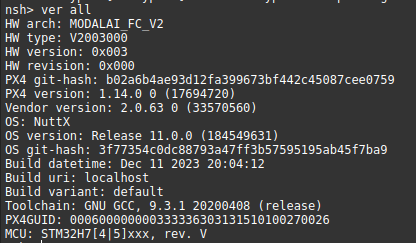
Adding the following two parameters to the list and load parameter from file seems to fix it for me? I could not find these 2 parameters in QGC initally. I am using the latest version of QGC (v4.30).

I tried to remove these 2 parameters but I could not reproduce my issue, i can still see the voxlpm output afterwards.
-
RE: Supporting power monitor to see battery statusposted in Flight Core v2
Tagging along here. I observed similar issue with the voxlpm driver on Flight core v2.
Personally I have been working on a voxl1 + flight core v2 (I have 2 set of this). I am using the older v2 power module https://docs.modalai.com/power-module-v2-datasheet/ connected to a standard 4s LiPo battery.
The version of my flight core shown below.
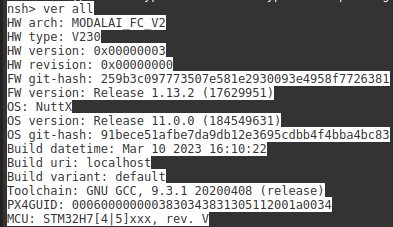 .
.I am seeing that one of the flight-core (rarely use this, mostly as backup) has output by voxlpm as shown below,

while my other flight core (mainly working on this) is not giving any output (shown below)

Both flight core able to detect the i2c port at bus 3 address 44 and 45.
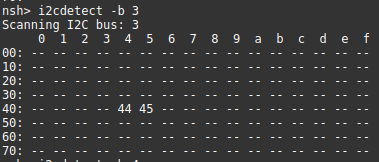
https://github.com/PX4/PX4-Autopilot/blob/main/src/drivers/power_monitor/voxlpm/voxlpm.hpp
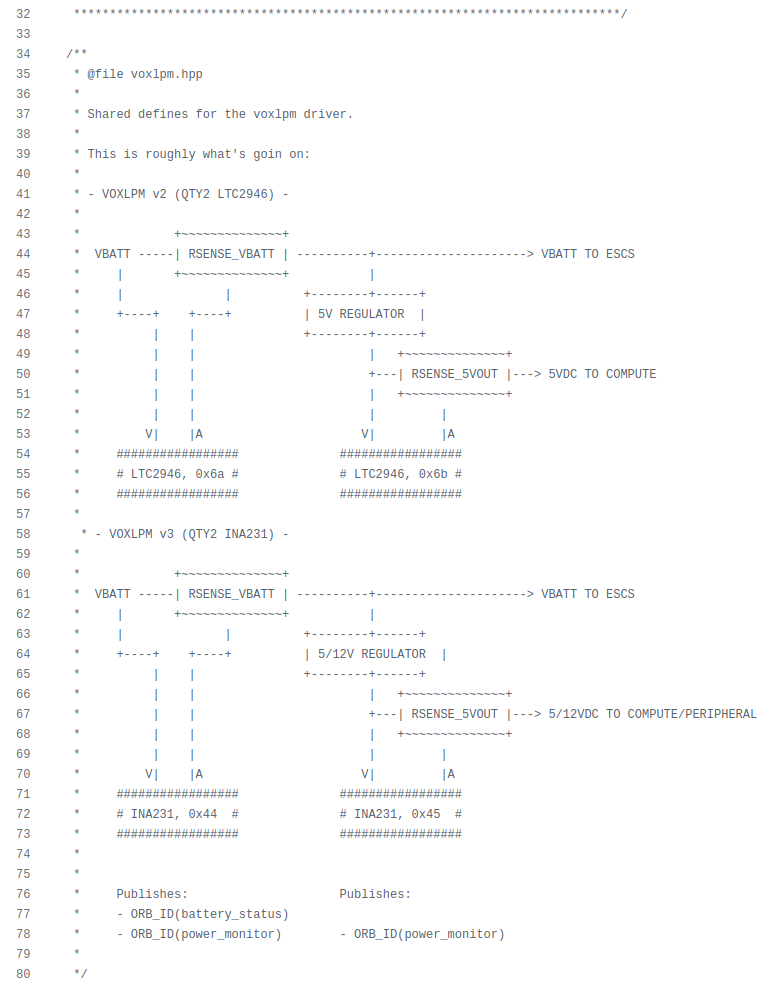
I assume the firmware on my board (1.13.2) is using the voxlpmv3 and sensing on the address 0x44 as the default voxlpm is sensing at the RSENSE_VBATT.
Any idea what might be the case? Is there a way to observe the uORB id for battery_status or monitor the process when voxlpm start at boot?
What i have tried.
- Use same power module connector.
- Load the same px4 parameter.
- Updating to the latest sdk 1.12 and px4 1.14 firmware http://voxl-packages.modalai.com/dists/fc-v2/sdk-1.1/modalai_fc-v2_1.14.0-2.0.63.px4
-
RE: USB tethering with VOXLposted in VOXL Flight
Hi Alex, thanks for the quick response.
For now we are going option A with a wifi adapter. That works well.In the meantime I am moving on to other stuff.
I tried recompiling the kernel with https://gitlab.com/voxl-public/system-image-build/meta-voxl/-/tree/master?ref_type=heads enabling the usb_gadget flag but no luck so far.
Apparently yocto does not have a simple way to just "make menuconfig"Will keep this post updated if i manage to get it.
-
RE: USB tethering with VOXLposted in VOXL Flight
Dear @Moderator,
That is true but we are expecting a data rate much higher than what UART is able to provide.
-
USB tethering with VOXLposted in VOXL Flight
Hi,
I have been following this thread https://forum.modalai.com/topic/851/rndis-connection?_=1704780402514.
I have a Jetson nano and a Voxl flight deck with the base Linux Yocto Jethro with 3.18 kernel System Image but my jetson nano does not have any Ethernet port and wireless adapter.
I was planning to reverse USB tether so that the network from voxl can extend to the jetson nano.By default, the jetson nano have a usb0 virtual Ethernet interface and I verify it by connecting my PC (host) and jetson nano (device).
https://jetbot.org/master/software_setup/wifi_setup.html.However, there is no interface when i try to connect my voxl (host) to jetson nano (device).
From the guide, https://docs.modalai.com/voxl-as-usb-host , i suspect it is my OTG cable being incompatible.With that, i am considering setting up rndis for the voxl flight such that i can do jetson nano (host) and voxl (device) instead.
Is there a guide on how to do so? Or will it be less pain to just get different cables and retry. -
RE: Are there any URDF for the dev drones>?posted in VOXL Dev Drones
@skl1g14
in case anyone looking for URDF for m500 drone, i have it here
https://github.com/UoSM-CIRG/CAD-Files/tree/master/drone_dev_kit/catkin_ws/src/display_model/description/m500_urdf/urdf